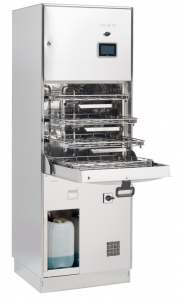It’s World Cancer Day on the 4th February, and it’s a stark reminder that 10 million people die of the disease each year. Treatment is invasive, and all cancer patients have the right to treatment in a safe environment.
Care homes, oncology units and hospital wards should all follow rigid hygiene protocols that have been designed to keep all patients safe.
 Why are cancer patients vulnerable to infection?
Why are cancer patients vulnerable to infection?
Many cancer treatments like chemotherapy, radiation therapy and bone marrow or stem cell transplants can cause neutropenia. This is when the patient has a lower than normal number of neutrophils (or white blood cells) in their body.
These white blood cells make up part of the immune system and play a key role in defending the body against germs.
When patients undergo cancer treatment, their neutrophil count can drop, leaving them susceptible to serious infection.
How can infection breakouts be prevented?
All settings caring for and treating cancer patients need to follow strict cleaning guidelines and be vigilant in spotting infection signs. A quick response could save somebody’s life.
Education is key
Ensure all staff and patients understand the visible signs of infection. These include:
- Fever
- Fatigue
- Cough or shortness of breath
- New areas or redness or tenderness
- Sores in the mouth
If patients, carers and health care workers know how to recognise a possible infection, you’ll be able to treat the infection quickly and stop it from spreading to other cancer patients.
 Have a robust infection control policy
Have a robust infection control policy
The policies and procedures your department have in place will be vital to keeping everyone safe.
This includes frequent hand washing before and after caring for a patient and touching a patient’s items.
PPE should be worn correctly. Ensure gloves and disposable aprons are changed after each patient has been cared for and disposed of safely.
Respiratory hygiene should also be followed. This has become more important during the pandemic. Masks should be worn to reduce the spread of germs in the air. Having good ventilation with windows open is also a good way of preventing infection from spreading.
You should never reuse syringes, needles, saline bags, single-dose vials and IV tubing.
Equipment that can be reused should be washed in a washer disinfector to ensure they are cleaned and disinfected correctly. A washer disinfector makes sure things like catheters, bedpans and urine bottles are safe to reuse.
Aseptic techniques must be used. This is particularly important for people undergoing cancer treatments who are immunosuppressed.
Frequent cleaning and disinfecting of devices and surfaces are needed. All staff responsible need to understand how to clean and disinfect correctly to ensure any dangerous pathogens are removed swiftly.
 Dekomed can help
Dekomed can help
At Dekomed, we understand how important it is to keep cancer patients safe from infection. Having worked in the industry for over 30 years, we know infection control and how to implement best practice.
That’s why so many health care settings come to us to buy washer disinfectors. We can recommend the perfect model for your workspace, help you decide where to put it and help you install it safely.
We will also carry out regular service checks and have an expert team of engineers on hand.
If you want to know more, call us on 0161 483 7333

